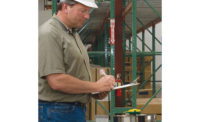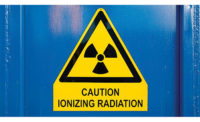30 things to know about emergency showers & eyewash stations
OSHA references voluntary requirements for placement & performance

1
Emergency showers shall be capable of delivering flushing fluid at a minimum of 75.7 liters per minute (20 gpm) for a minimum of 15 minutes. If shut-off valves are installed in the supply line for maintenance purposes, provisions shall be made to prevent unauthorized shut off.
ANSI/ISEA Z358.1-2014
2
Emergency showers shall provide a flushing fluid column that is at least 208.3 cm (82 in.) and not more than 243.8 cm (96 in.) in height from the surface on which the user stands.
ANSI/ISEA Z358.1-2014
3
The spray pattern shall have a minimum diameter of 50.8 cm (20 in.) at 152.4 cm (60 in.) above the surface on which the user stands, and the center of the spray pattern shall be located at least 40.6 cm (16 in.) from any obstruction.
ANSI/ISEA Z358.1-2014
4
Emergency showers shall be designed, manufactured and installed in such a manner that, once activated, they can be used without requiring the use of the operator’s hands.
ANSI/ISEA Z358.1-2014
5
Emergency showers shall be constructed of materials that will not corrode in the presence of the flushing fluid. Stored flushing fluid shall be protected against airborne contaminants.
ANSI/ISEA Z358.1-2014
6
Plumbed emergency showers shall be activated weekly for a period long enough to verify operation and ensure that flushing fluid is available.
ANSI/ISEA Z358.1-2014
7
Self-contained emergency showers shall be visually checked weekly to determine if flushing fluid needs to be changed or supplemented. Such inspection shall be conducted in accordance with manufacturer’s instructions.
ANSI/ISEA Z358.1-2014
8
Employees who may be exposed to hazardous materials shall be instructed in the location and proper use of emergency showers.
ANSI/ISEA Z358.1-2014
9
All emergency showers shall be inspected annually to assure conformance with this standard.
ANSI/ISEA Z358.1-2014
10
Eyewashes shall be designed, manufactured and installed in such a manner that, once activated, they can be used without requiring the use of the operator’s hands.
ANSI/ISEA Z358.1-2014
11
Nozzles and flushing fluid units shall be protected from airborne contaminants. Whatever means is used to afford such protection, its removal shall not require a separate motion by the operator when activating the unit.
ANSI/ISEA Z358.1-2014
12
Eyewashes shall be constructed of materials that will not corrode in the presence of the flushing fluid.
ANSI/ISEA Z358.1-2014
13
Eyewashes shall be capable of delivering flushing fluid to the eyes not less than 1.5 liters per minute (0.4 gpm) for 15 minutes. If shut-off valves are installed in the supply line for maintenance purposes, provisions shall be made to prevent unauthorized shut off.
ANSI/ISEA Z358.1-2014
14
Eyewashes shall be designed to provide enough room to allow the eyelids to be held open with the hands while the eyes are in the flushing fluid stream.
ANSI/ISEA Z358.1-2014
15
Eyewashes shall provide flushing fluid to both eyes simultaneously.
ANSI/ISEA Z358.1-2014
16
Plumbed eyewashes shall be activated weekly for a period long enough to verify operation and ensure that flushing fluid is available.
ANSI/ISEA Z358.1-2014
17
Self-contained eyewashes shall be visually checked weekly to determine if flushing fluid needs to be changed or supplemented. Such inspection shall be conducted in accordance with manufacturer’s instructions.
ANSI/ISEA Z358.1-2014
18
Employees who may be exposed to hazardous materials shall be instructed in the location and proper use of emergency eyewashes.
ANSI/ISEA Z358.1-2014
19
All eyewashes shall be inspected annually to assure conformance with this standard.
ANSI/ISEA Z358.1-2014
20
The OSHA requirements for emergency eyewashes and showers, found at 29 CFR 1910.151(c), (Medical Services and First Aid) specify that "where the eyes or body of any person may be exposed to injurious corrosive materials, suitable facilities for quick drenching or flushing of the eyes and body shall be provided within the work area for immediate emergency use.”
OSHA Letter of Interpretation
21
If none of the materials used in a work area is an injurious corrosive [chemical] (as indicated by the Safety Data Sheet (SDS) for each product), then an emergency eyewash or shower would not be required pursuant to 1910.151(c).
OSHA Letter of Interpretation
22
While not having the force of a regulation under the OSH Act, the current ANSI standard addressing emergency eyewash and shower equipment (ANSI [Z]358.1) provides for eyewash and shower equipment in appropriate situations when employees are exposed to hazardous materials.
OSHA Letter of Interpretation
23
ANSI's definition of "hazardous material" would include caustics, as well as additional substances and compounds that have the capability of producing adverse effects on the health and safety of humans.
OSHA Letter of Interpretation
24
OSHA does not, at this time, have standards or requirements specific to the installation and operation of emergency eyewashes and showers in freezing and hot temperature areas.
OSHA Letter of Interpretation
25
For specific requirements, OSHA refers to consensus standard ANSI Z358.1 through the General Duty Clause, Section 5(a)(1) of the Occupational Safety and Health (OSH) Act.
OSHA Letter of Interpretation
26
ANSI's standard also provides detail with respect to the location, installation, nature, and maintenance of eyewash and shower equipment.
OSHA Letter of Interpretation
27
When considering potential chemical exposures to the eye you might want to consult W. Morton Grant's Toxicology of the Eye (Charles C Thomas Pub. Ltd., 4th edition, August 1993).
OSHA Letter of Interpretation
28
Severity of injury, time of exposure, and number of employees exposed are all considered by compliance officers in determining the required number of eyewash stations, shower stations, or both eyewash and shower stations.
OSHA Letter of Interpretation
29
Severity of an exposure should be considered when buying eyewash equipment. .
OSHA Letter of Interpretation
30
OSHA has adopted no specific requirements regarding flow rates for drenching/flushing facilities. ANSI Z358.1 provides detailed information regarding the installation and operation of emergency eyewash and shower equipment, including the requirements.
OSHA Letter of Interpretation
Looking for a reprint of this article?
From high-res PDFs to custom plaques, order your copy today!








